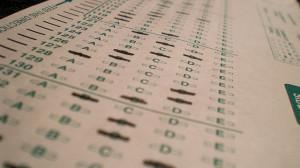Tests are a part of everyday life for most of us, whether they be for obtaining a driver’s license, for earning professional continuing-education credits, or for demonstrating that you understand chapter four in a high-school geometry course. There are many strategies for preparing for tests, but only a few have been shown to be truly effective. First, let’s look at approaches that don’t work. One of the least effective methods of studying for a test is rereading. Studies have shown that rereading instructional materials is time consuming and results in almost no improvement on tests. The same goes for “going over” notes and for re-listening to recorded lectures. Pulling all-nighters and other kinds of cramming are also ineffective.
 So what works? First, begin early. Depending on the scope of the test in question, this will mean preparing days, weeks, or even months ahead of time. All areas of study have a vocabulary, a set of specialized terms used to talk about important concepts. Set up a schedule to learn a few terms per day. Make sure that you understand each term before trying to learn its definition. Speak or write each definition. Each successive day, review what you have learned so far and learn a few more. Plan to finish the entire list well ahead of the test date, so that you can review the entire list multiple times.
So what works? First, begin early. Depending on the scope of the test in question, this will mean preparing days, weeks, or even months ahead of time. All areas of study have a vocabulary, a set of specialized terms used to talk about important concepts. Set up a schedule to learn a few terms per day. Make sure that you understand each term before trying to learn its definition. Speak or write each definition. Each successive day, review what you have learned so far and learn a few more. Plan to finish the entire list well ahead of the test date, so that you can review the entire list multiple times.
Arrange to do memorization tasks, like learning vocabulary, in many short sessions of about 15 minutes each. Learn overarching concepts in blocks of time of 30 minutes or more. Use this time to write out explanations in essay form or in bulleted lists.
The most efficient and powerful way of preparing for any kind of assessment is to simulate the test as closely as possible. (You’ll notice that studying your state’s driver education booklet, for instance, will prepare you for the written driver’s exam but will not help you at all for the behind-the-wheel test.) If there are practice tests available, use them. After each practice test, analyze your mistakes before taking another practice test. If no practice tests are available, write your own. Make a separate answer key. Find a classmate to make up his or her own test on the same material, and quiz each other. Discuss each other’s answers. Are they correct? Are they complete? Are they comprehensive?
